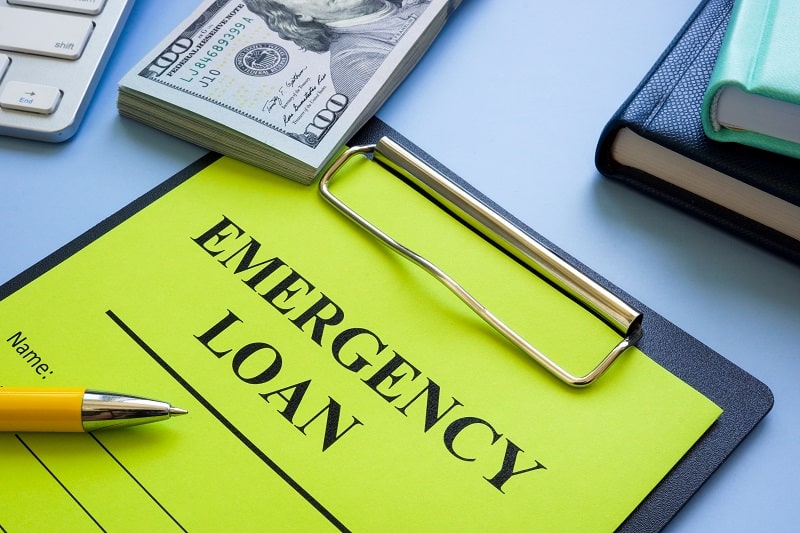Financial hardship can happen to anyone. Whether due to a job loss or unexpected medical expenses, car repairs, or other costly emergencies, a surprise expense can quickly tip the scale from comfortable to struggling. If you have an established emergency savings account, an unexpected expense may be nothing more than an inconvenience. However, when money is already tight, it can be difficult to put money away for emergencies when you need every penny now to cover your basic needs. If you find yourself facing an unexpected expense without the means to cover the cost, you may want to consider taking out an emergency loan.
What is an emergency loan and is it the right option for you? Here are the basics you need to know:
Emergency loan
An emergency loan is a means for getting cash quickly. Available through personal loans, payday loans, and credit card cash advances, an emergency loan provides you with the cash you need when you need it – but at a cost. The terms of your emergency loan can quickly transform the moderate amount of cash you need for that emergency into a hefty burden as you work to pay the loan off, adding to your financial hardship.
Interest rates on this borrowed money can be high. Depending on your credit history, the lender, and the option you choose, you could experience interest rates as high as one hundred percent for personal loans and an astronomical four hundred percent for payday loans! Even cash advances from credit card providers charge a higher interest rate on the advanced amount than what is applied to your regular credit card purchases.
In addition to the possibility of extremely high interest rates, you may also see other fees associated with your loan such as a cash advance fee for advances borrowed against your credit card. So, while an emergency loan is an option for covering those unexpected expenses, it is important to explore every available avenue to ensure the potential costs associated with taking out an emergency loan are manageable.
Does an emergency loan impact my credit?
Depending on your lender, the application process for your emergency loan could result in a hard credit inquiry which has a negative impact on your credit and can drop your credit score. If you are approved for the emergency loan, your debt-to-income ratio will increase as it does anytime you open a new line of credit. This is another factor that can drop your credit score.
It is imperative to make timely payments and avoid defaulting on an emergency loan. These loans typically have strict conditions and lenders are less sympathetic for late or missed payments, meaning the account could be turned over to collections more quickly which will adversely affect your credit. Payday loan lenders are often quick to file a lawsuit for delinquent accounts in pursuit of a judgment which, if awarded, will not only be detrimental to your credit but can also put you at risk of a wage garnishment, property levies, and other means of enforcing the judgment.
Where can I get an emergency loan?
After you have weighed your options, if you want to use an emergency loan to cover your expenses, it is important to shop around for the best terms from the most favorable lenders. Even before you apply, do your research into which loan providers offer the lowest interest rates with the longest loan repayment terms.
Be mindful of your current financial situation and be realistic about how that situation will look in the coming weeks and months. Often, emergency loans can put the borrower into a worse position than before taking out the loan thanks to the costly fees, high interest rates, and tough repayment terms. If there is a risk you will not be able to meet the repayment terms for an emergency loan, it would be in your best interest to revisit other options for covering the unexpected expense rather than setting yourself up for more financial strain down the road with an emergency loan.
You can check with your credit card providers to see what kind of cash advance options are available and what the repayment terms would be. This is probably the best starting point for obtaining an emergency loan, especially if you have a long-established credit history with your credit card provider. Credit card cash advance loans typically have the most favorable terms compared to personal loans or payday loan options. If your credit card provider is not an option, investigate personal loans first, and explore payday loan options only as a last resort. While both options are often costly, payday loans tend to bear the most challenging repayment terms and providers have a reputation for being quick to harsh collections actions against struggling borrowers.
An emergency loan can be a great option when you are faced with an unplanned emergency expense that you do not have the cash to cover. However, emergency loans are best for those with good credit who have the means to satisfy the often challenging repayment terms. If you are in the middle of financial hardship without a foreseeable change, an emergency loan may not be the best option for you.
To learn more about emergency loans and whether you might qualify for one, reach out to a certified financial planner or credit counselor. Also, it is always a good idea to do all you can to improve your credit so that you have ample options at your disposal.


